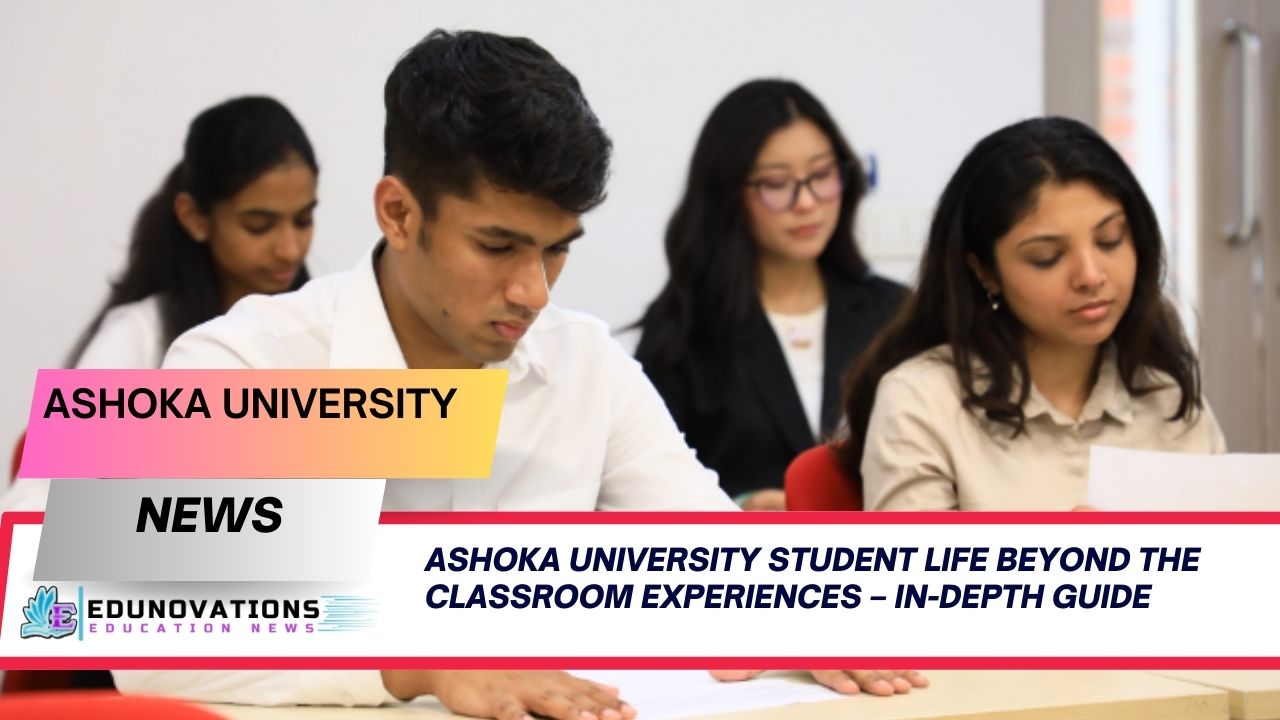Explore how Ashoka University student life beyond the classroom experiences foster creativity, leadership, and campus engagement for holistic growth.
Introduction
At Ashoka University, student life goes far beyond traditional lectures and exams. It’s a dynamic ecosystem where academic rigor meets creative expression, leadership development, and meaningful social engagement. The university emphasizes holistic development, ensuring that every student experiences growth in multiple dimensions—intellectual, social, and personal.
Through a combination of Ashoka University student life beyond the classroom experiences, students gain opportunities to engage with peers, explore their interests, and develop skills that prepare them for life beyond university walls. This article explores seven ways Ashoka transforms student life, offering insights for prospective students, educators, and academic enthusiasts.
1. Vibrant Campus Communities
Ashoka University’s campus is designed to nurture connections through spaces that encourage collaboration, discussion, and creativity. From interactive classrooms to common lounges, every space fosters engagement. The campus hotspots at Ashoka University for student engagement are hubs where students brainstorm, debate, and form lifelong friendships.
These hotspots include well-equipped common rooms, student lounges, and activity halls. According to recent surveys, students who actively participate in campus communities report higher satisfaction levels, improved mental wellness, and stronger professional networks.
Toppers Use Mind Maps to score more than 95%
NCERT Class 11th Commerce Mind Maps
Add to cartOriginal price was: ₹999.00.₹199.00Current price is: ₹199.00.NCERT Class 12th Chemistry Mind Maps
Add to cartOriginal price was: ₹199.00.₹75.00Current price is: ₹75.00.NCERT Class 12th Commerce Mind Maps
Add to cartOriginal price was: ₹999.00.₹199.00Current price is: ₹199.00.NCERT Class 12th Science Mind Maps
Add to cartOriginal price was: ₹999.00.₹199.00Current price is: ₹199.00.NCERT Mind Maps For Class 10th
Add to cartOriginal price was: ₹999.00.₹199.00Current price is: ₹199.00.
Purchase Today
2. Residential Life That Inspires Collaboration
Residences at Ashoka University are not just places to sleep—they are incubators for collaboration. Ashoka University residence hall lounges and social spaces encourage informal learning and networking. Students share ideas, organize events, and participate in peer-led workshops, fostering a sense of belonging and collective responsibility.
The residential experience is complemented by mentorship programs where senior students guide newcomers, enhancing personal development and easing the transition into university life.
3. Encouraging Leadership and Student Governance
Leadership opportunities at Ashoka extend beyond academics. The Ashoka University student government and leadership opportunities provide platforms for students to organize events, manage projects, and represent the student body. These initiatives develop crucial soft skills such as communication, negotiation, and decision-making.
For instance, student councils oversee annual cultural fests, academic seminars, and sustainability projects, giving participants hands-on experience in leadership and event management. Such exposure prepares students for leadership roles in their professional and personal lives.
4. A Thriving Extracurricular Ecosystem
Ashoka University encourages participation in sports, arts, and cultural activities. The student life office at Ashoka University promoting extracurriculars ensures that students have access to clubs, workshops, and competitions.
Students can join drama societies, music ensembles, debate clubs, or sports teams, enhancing creativity, physical well-being, and teamwork skills. Studies indicate that active involvement in extracurricular activities improves academic performance and emotional resilience.
5. Holistic Academic Support
While beyond-classroom experiences are critical, academic support remains central to Ashoka University’s mission. Peer tutoring, academic mentoring, and collaborative study sessions complement traditional classroom learning. The university’s faculty and student support networks provide guidance, ensuring students excel in both academic and co-curricular domains.
Internal resources such as NCERT Courses, Notes, and MCQs can further supplement a student’s learning journey.
6. Engaging with the Wider Community
Ashoka University fosters social responsibility and civic engagement. Students actively participate in community projects, awareness campaigns, and social innovation initiatives. These activities nurture empathy, problem-solving, and leadership in real-world contexts.
For instance, students collaborate with NGOs, local schools, and community centers, ensuring their academic knowledge translates into meaningful societal impact. External resources such as Mart Ind Infotech provide insights and connections for community engagement projects.
7. Personal Growth Through Reflection and Mentorship
A key pillar of Ashoka University’s student life model is personal development. Through reflection, mentorship, and guided self-assessment, students understand their strengths, interests, and career aspirations. Faculty mentors and senior peers provide guidance, creating a nurturing environment that balances academic challenges with personal growth.
These experiences are designed to empower students to make informed decisions, develop resilience, and pursue lifelong learning.
Expert Insights
Dr. Ritu Sinha, an educational consultant, notes, “Ashoka University’s model emphasizes learning as an immersive experience. Students not only acquire knowledge but also develop leadership, collaboration, and social responsibility skills essential for modern careers.”
According to a 2024 survey, 85% of Ashoka students reported that participation in extracurriculars and leadership roles positively influenced their employability and life skills.
Key Takeaways
- Ashoka University integrates academic rigor with student life beyond the classroom experiences.
- Campus design, residential life, and extracurricular opportunities foster holistic growth.
- Leadership, mentorship, and civic engagement prepare students for professional and societal challenges.
- Collaboration with peers, faculty, and the wider community enhances learning outcomes.
FAQs
- What are Ashoka University student life beyond the classroom experiences?
These include leadership programs, extracurricular activities, community engagement, and residential interactions that complement academic learning. - Which campus hotspots at Ashoka University encourage student engagement?
Common lounges, activity halls, and interactive classrooms are key spaces for collaboration and networking. - How do Ashoka University residence hall lounges and social spaces support students?
They promote informal learning, peer mentorship, and social bonding among students. - What student life office initiatives promote extracurriculars at Ashoka University?
Clubs, workshops, competitions, and sports activities are organized to foster creativity and teamwork. - How does Ashoka University student government and leadership opportunities enhance development?
Students gain hands-on leadership experience by managing projects, events, and representing peers. - How can students access holistic academic support at Ashoka University?
Through peer tutoring, mentoring, collaborative study sessions, and online resources like NCERT Courses and Notes. - How does Ashoka University engage students with the wider community?
By facilitating social innovation projects, NGO collaborations, and awareness campaigns. - What role does mentorship play in Ashoka University student life?
Mentorship provides guidance, helps students reflect on goals, and fosters personal and academic growth. - Are extracurricular activities beneficial for Ashoka University students?
Yes, they improve creativity, teamwork, resilience, and overall student satisfaction. - Where can prospective students find additional learning resources?
Internal links like MCQs and Videos and external resources like Mart Ind Infotech are recommended.














